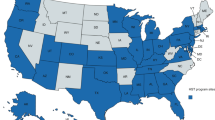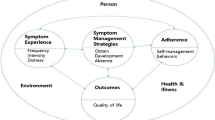Abstract
This study examined barriers to mental health service use and the demographic, medical and psychosocial correlates of these barriers among hematopoietic SCT (HSCT) survivors. A sample of 253 HSCT survivors who were 1 to 3 years posttransplant completed measures of demographic, physical, psychological and social characteristics as well as a newly modified measure of barriers to mental health service use. Only 50% of distressed HSCT survivors had received mental health services. An exploratory factor analysis of the barriers to mental health service use scale yielded four factors: scheduling barriers, knowledge barriers, emotional barriers and illness-related barriers. Patients with higher social constraints (perceived problems discussing the illness experience with significant others) reported higher levels of all four types of barriers. General distress and transplant-related posttraumatic stress symptoms were positively associated with emotional, knowledge and illness-related barriers to mental health service use, whereas physical and functional well-being were inversely associated with these barriers. Having more knowledge barriers and more emotional barriers predicted a lower likelihood of receiving mental health services, as did lower levels of education and general distress. Results suggest that a significant number of HSCT survivors may benefit from education about mental health services that is tailored to individual barriers.
This is a preview of subscription content, access via your institution
Access options
Subscribe to this journal
Receive 12 print issues and online access
$259.00 per year
only $21.58 per issue
Buy this article
- Purchase on Springer Link
- Instant access to full article PDF
Prices may be subject to local taxes which are calculated during checkout
Similar content being viewed by others
References
Copelan EA . Hematopoietic stem-cell transplantation. N Engl J Med 2006; 354: 1813–1826.
Mosher CE, Redd WH, Rini CM, Burkhalter JE, DuHamel KN . Physical, psychological, and social sequelae following hematopoietic stem cell transplantation: a review of the literature. Psychooncology 2009; 18: 113–127.
Rusiewicz A, DuHamel KN, Burkhalter J, Ostroff J, Winkel G, Scigliano E et al. Psychological distress in long-term survivors of hematopoietic stem cell transplantation. Psychooncology 2008; 17: 329–337.
DuHamel KN, Ostroff J, Ashman T, Winkel G, Mundy EA, Keane TM et al. Construct validity of the posttraumatic stress disorder checklist in cancer survivors: analyses based on two samples. Psychol Assess 2004; 16: 255–266.
Jacobsen PB, Widows MR, Hann DM, Andrykowski MA, Kronish LE, Fields KK . Posttraumatic stress disorder symptoms after bone marrow transplantation for breast cancer. Psychosom Med 1998; 60: 366–371.
Jacobsen PB, Sadler IJ, Booth-Jones M, Soety E, Weitzner MA, Fields KK . Predictors of posttraumatic stress disorder symptomatology following bone marrow transplantation for cancer. J Consult Clin Psychol 2002; 70: 235–240.
Lee SJ, Loberiza FR, Antin JH, Kirkpatrick T, Prokop L, Alyea EP et al. Routine screening for psychosocial distress following hematopoietic stem cell transplantation. Bone Marrow Transplant 2005; 35: 77–83.
Widows MR, Jacobsen PB, Fields KK . Relation of psychological vulnerability factors to posttraumatic stress disorder symptomatology in bone marrow transplant recipients. Psychosom Med 2000; 62: 873–882.
Carroll BT, Kathol RG, Noyes R Jr, Wald TG, Clamon GH . Screening for depression and anxiety in cancer patients using the Hospital Anxiety and Depression Scale. Gen Hosp Psychiatry 1993; 15: 69–74.
Zabora J, BrintzenhofeSzoc K, Curbow B, Hooker C, Piantadosi S . The prevalence of psychological distress by cancer site. Psychooncology 2001; 10: 19–28.
Holland JC, Andersen B, Breitbart WS, Dabrowski M, Dudley MM, Fleishman S et al. Distress management. J Natl Compr Canc Netw 2007; 5: 66–98.
Institute of Medicine. Implementing Cancer Survivorship Care Planning. The National Academies Press: Washington, DC, 2007.
President's Cancer Panel. Living beyond cancer: Finding a new balance. President's Cancer Panel 2003–2004, Annual Report. National Cancer Institute, National Institutes of Health, Department of Health and Human Services: Bethesda, MD, 2004.
Hewitt M, Rowland JH . Mental health service use among adult cancer survivors: analyses of the national health interview survey. J Clin Oncol 2002; 20: 4581–4590.
Eakin EG, Strycker LA . Awareness and barriers to use of cancer support and information resources by HMO patients with breast, prostate, or colon cancer: patient and provider perspectives. Psychooncology 2001; 10: 103–113.
Carlson LE, Angen M, Cullum J, Goodey E, Koopmans J, Lamont L et al. High levels of untreated distress and fatigue in cancer patients. Br J Cancer 2004; 90: 2297–2304.
Weathers FW, Litz BT, Herman DS, Huska JA, Keane TM . The PTSD Checklist: reliability, validity, and diagnostic utility. Paper presented at the annual meeting of the International Society for Traumatic Stress Studies; San Antonio, TX, 1993.
Andrykowski MA, Cordova MJ, Studts JL, Miller TW . Posttraumatic stress disorder after treatment for breast cancer: Prevalence of diagnosis and use of the PTSD Checklist–Civilian Version (PCL-C) as a screening instrument. J Consult Clin Psychol 1998; 66: 586–590.
Cordova MJ, Andrykowski MA, Kenady DE, McGrath PC, Sloan DA, Redd WH . Frequency and correlates of posttraumatic-stress-disorder-like symptoms after treatment for breast cancer. J Consult Clin Psychol 1995; 63: 981–986.
Derogatis LR . Brief Symptom Inventory: Administration, Scoring, and Procedures Manual. 3rd edn. National Computer Systems Inc.: Minneapolis, MN, 1993.
Zabora JR, Blanchard CG, Smith ED, Roberts CS, Glajchen M, Sharp JW et al. Prevalence of psychological distress among cancer patients across the disease continuum. J Psychosoc Oncol 1997; 15: 73–87.
Cella DF . FACT manual: Functional Assessment of Cancer Therapy Scale and the Functional Assessment of HIV Infection (FAHI) Scale. Rush-Presbyterian-St Luke's Medical Center: Chicago, 1994.
Cella DF, Tulsky DS, Gray G, Sarafian B, Linn E, Bonomi A et al. The functional assessment of cancer therapy scale: development and validation of the general measure. J Clin Oncol 1993; 11: 570–579.
McQuellon RP, Russell GB, Cella DF, Craven BL, Brady M, Bonomi A et al. Quality of life measurement in bone marrow transplantation: Development of the Functional Assessment of Cancer Therapy—Bone Marrow Transplant (FACT-BMT) scale. Bone Marrow Transplant 1997; 19: 357–368.
Manne S, Schnoll RA . Measuring supportive and unsupportive responses to cancer treatment: a factor analysis of the partner responses to cancer inventory. J Behav Med 2001; 24: 297–321.
Frazier PA, Tix AP, Barnett CL . The relational context of social support: relationship satisfaction moderates the relations between enacted support and distress. Pers Soc Psychol Bull 2003; 29: 1133–1146.
Lepore SJ, Ituarte PHG . Optimism about cancer enhances mood by reducing negative social interactions. Cancer Res Ther Control 1999; 8: 165–174.
Lepore SJ . A social-cognitive processing model of emotional adjustment to cancer. In: Andersen BL, Baum A (eds). Psychosocial Interventions for Cancer. American Psychological Association: Washington DC, 2001. pp 99–116.
Lepore SJ, Silver RC, Wortman CB, Wayment HA . Social constraints, intrusive thoughts, and depressive symptoms among bereaved mothers. J Pers Soc Psychol 1996; 70: 271–282.
Tabachnick BG, Fidell LS . Using Multivariate Statistics, 4th edn. Allyn & Bacon: Needham Heights, MA, 2001.
Smith MY, Redd W, DuHamel K, Vickberg SJ, Ricketts P . Validation of the PTSD Checklist—Civilian Version in survivors of bone marrow transplantation. J Trauma Stress 1999; 12: 485–499.
Kadan-Lottick NS, Vanderwerker LC, Block SD, Zhang B, Prigerson HG . Psychiatric disorders and mental health service use in patients with advanced cancer. Cancer 2005; 104: 2872–2881.
Addis ME, Mahalik JR . Men, masculinity, and the contexts of help seeking. Am Psychol 2003; 58: 5–14.
Wang PS, Berglund P, Olfson M, Pincus HA, Wells KB, Kessler RC . Failure and delay in initial treatment contact after first onset of mental disorders in the National Comorbidity Survey Replication. Arch Gen Psychiatry 2005; 62: 603–613.
Vickberg SMJ, DuHamel KN, Smith MY, Manne SL, Winkel G, Papadopoulos EB et al. Global meaning and psychological adjustment among survivors of bone marrow transplant. Psychooncology 2001; 10: 29–39.
Ponterotto JG, Ruckdeschel DE . An overview of coefficient alpha and a reliability matrix for estimating adequacy of internal consistency coefficients with psychological research measures. Percept Mot Skills 2007; 105: 997–1014.
Massie MJ . Prevalence of depression in patients with cancer. J Natl Cancer Inst Monogr 2004; 32: 57–71.
Devine EC, Westlake SK . The effects of psychoeducational care provided to adults with cancer: meta-analysis of 116 studies. Oncol Nurs Forum 1995; 22: 1369–1381.
Meyer TJ, Mark MM . Effects of psychosocial interventions with adult cancer patients: a meta-analysis of randomized experiments. Health Psychol 1995; 14: 101–108.
Acknowledgements
We gratefully acknowledge the contributions of Yeraz Markarian, Julian Silva and the participating HSCT survivors. This research was supported by the National Cancer Institute Grant nos. R01CA093609, 1F32CA130600 (CM) and K07CA104701 (CR).
Author information
Authors and Affiliations
Corresponding author
Rights and permissions
About this article
Cite this article
Mosher, C., DuHamel, K., Rini, C. et al. Barriers to mental health service use among hematopoietic SCT survivors. Bone Marrow Transplant 45, 570–579 (2010). https://doi.org/10.1038/bmt.2009.166
Received:
Revised:
Accepted:
Published:
Issue Date:
DOI: https://doi.org/10.1038/bmt.2009.166
Keywords
This article is cited by
-
Provision of long-term monitoring and late effects services following adult allogeneic haematopoietic stem cell transplant: a survey of UK NHS-based programmes
Bone Marrow Transplantation (2017)
-
Barriers to psychological care among primary caregivers of children undergoing hematopoietic stem cell transplantation
Supportive Care in Cancer (2016)
-
A meta-analysis of the relationship between social constraints and distress in cancer patients
Journal of Behavioral Medicine (2015)



